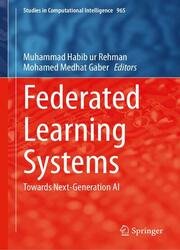Federated Learning Systems: Towards Next-Generation AI
- Добавил: literator
- Дата: 13-06-2021, 00:33
- Комментариев: 0
 Название: Federated Learning Systems: Towards Next-Generation AI
Название: Federated Learning Systems: Towards Next-Generation AIАвтор: Muhammad Habib ur Rehman, Mohamed Medhat Gaber
Издательство: Springer
Год: 2021
Страниц: 207
Язык: английский
Формат: pdf (true), epub
Размер: 22.9 MB
Google introduced the term Federated Learning (FL) to enable the Machine Learning models to be initially trained at the customers’ or citizens’ devices and systems and later the model updates are aggregated at the centralized cloud servers. Considering this notion of FL, a large plethora of research activities has been performed by researchers and practitioners in academia and industry. Hence, numerous research publications were produced to solve the active research issues in terms of privacy, security, data and model synchronization, model development and deployment, personalization, incentivization, and heterogeneity across the FL systems.
This book aims to study the FL ecosystem with a broader perspective to cover the theoretical as well as applied aspects of FL systems. Therefore, this book is structured into eight chapters in total. In the first chapter, Ali et al. performed a thorough bibliometric analysis of the field of FL. Authors have conducted thorough research of the Scopus database to uncover the publication trends. They found 476 scholarly documents in total and then analyzed the dataset to find the growth trends in FL research. Also, they studied subject areas and ranked them in terms of the number of publications. Also, they outlined the top-10 cited papers, top-10 authors, top-10 institutions, and top-10 countries. Moreover, they categorized the documents into various types and then uncovered the top-10 sources of these documents. Finally, the authors have performed the domain profiling of the FL research area and they identified five hot domains such as the internet of things (IoT), wireless communication, privacy and security, data analytics, and learning and optimization, where most of the FL research has been creating impact. Christopher et al., in Chap. 2, review FL as an approach for performing machine learning on distributed data to protect the privacy of user-generated data. They highlight pertinent challenges in an IoT context such as reducing communication costs associated with data transmission, learning from data under heterogeneous conditions, and applying additional privacy protections to FL. Throughout this review, they identify the strengths and weaknesses of different methods applied to FL, and finally, they outline future directions for privacy-preserving FL research, particularly focusing on IoT applications.
Chapter 5 presents the practitioner view on FL research whereby a group of researchers from the PySyft Community has elaborated on the key features of their FL tool. PySyft is an open-source multi-language library enabling secure and private machine learning by wrapping and extending popular deep learning frameworks such as PyTorch in a transparent, lightweight, and user-friendly manner. Its aim is to both help popularize privacy-preserving techniques in machine learning by making them as accessible as possible via Python bindings and common tools familiar to researchers and data scientists, as well as to be extensible such that new Federated Learning, Multi-Party Computation, or Differential Privacy methods can be flexibly and simply implemented and integrated. This chapter will introduce the methods available within the PySyft library and describe their implementations.
Скачать Federated Learning Systems: Towards Next-Generation AI
Внимание
Уважаемый посетитель, Вы зашли на сайт как незарегистрированный пользователь.
Мы рекомендуем Вам зарегистрироваться либо войти на сайт под своим именем.
Уважаемый посетитель, Вы зашли на сайт как незарегистрированный пользователь.
Мы рекомендуем Вам зарегистрироваться либо войти на сайт под своим именем.
Информация
Посетители, находящиеся в группе Гости, не могут оставлять комментарии к данной публикации.
Посетители, находящиеся в группе Гости, не могут оставлять комментарии к данной публикации.
